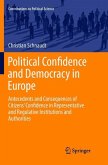"This fine team of academics moves beyond mere descriptions of capacities, structures and processes to explain the effectiveness of Civil Protection in the EU. With their exploration of trust as a key factor, they deliver the best book so far on this critical topic."-Arjen Boin, Leiden University, the Netherlands
"Grounded in unique and voluminous fieldwork within the EU's nascent community of civil protection practitioners and mechanisms, this timely study shows us that interpersonal and professional trust rooted in collegiate relationships is pivotal for bridging the different policy styles embedded in member states' administrative cultures and building much-needed cohesive, effective and resilient European crisis management capacity. A gem for crisis management and EU scholars alike."-Paul 't Hart, Utrecht University and Netherlands School of Public Administration, the Netherlands
The EU and its member states have committed themselves to the protection of their citizens, and a Europe that protects must be able to respond effectively when disaster strikes. Utilizing unique survey data and interviews in nineteen EU member states, this book treats civil protection and crisis management as crucial cases for investigating which factors-such as trust, public-administration culture, and public-administration structure-facilitate or hinder effective EU cooperation. In addition to investigating the main divides and unifying patterns of cooperation that exist among the EU member states, the authors combine knowledge from crisis management studies together with insights from public and social capital studies to examine to what extent so-called 'software factors', such as culture, trust, and norms, matter for achieving effective civil protection cooperation and crisis management.
"Grounded in unique and voluminous fieldwork within the EU's nascent community of civil protection practitioners and mechanisms, this timely study shows us that interpersonal and professional trust rooted in collegiate relationships is pivotal for bridging the different policy styles embedded in member states' administrative cultures and building much-needed cohesive, effective and resilient European crisis management capacity. A gem for crisis management and EU scholars alike."-Paul 't Hart, Utrecht University and Netherlands School of Public Administration, the Netherlands
The EU and its member states have committed themselves to the protection of their citizens, and a Europe that protects must be able to respond effectively when disaster strikes. Utilizing unique survey data and interviews in nineteen EU member states, this book treats civil protection and crisis management as crucial cases for investigating which factors-such as trust, public-administration culture, and public-administration structure-facilitate or hinder effective EU cooperation. In addition to investigating the main divides and unifying patterns of cooperation that exist among the EU member states, the authors combine knowledge from crisis management studies together with insights from public and social capital studies to examine to what extent so-called 'software factors', such as culture, trust, and norms, matter for achieving effective civil protection cooperation and crisis management.








